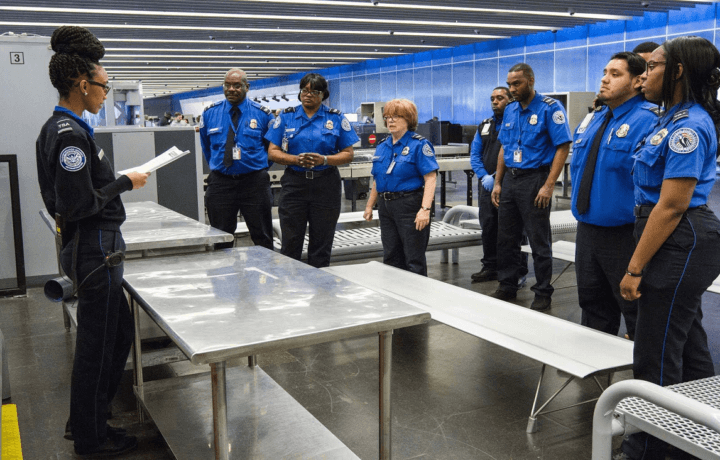The Transportation Security Administration has a big job: It screens more than 2 million people each day, according to its website. Charged with protecting the nation’s transportation systems, its agents and officials are responsible for using a variety of tactics—from law enforcement to technology, security operations, and more much—to keep passengers safe from counterterrorism.
You may have grown so accustomed to the role of the TSA that you can’t remember a time before the men and women in blue were a part of your airport security screening, but the agency is fairly new, born out of the need for increased airport security following the terrorist attack on Sept. 11.
But the agency’s purview isn’t limited to flight: In addition to commercial and general aviation, it oversees mass transit system; freight and passenger rail; and highways, pipelines and ports.
The TSA, a part of the Department of Homeland Security, “is a great place to start, build, and expand your career,” Thomas Tedesco, the agency’s field hiring operations branch manager, tells ClearanceJobs. “From law enforcement and technology to security operations and management, we seek dedicated individuals with the skills and desire to help safeguard our nation’s travelers.”
If you’d like to one day work at the TSA, here’s everything you need to know before applying.
What it’s like to work at the TSA
Tedesco says the TSA “is a mission-focused organization with core values of integrity, respect, and commitment, while its vision is to be “an agile security agency, embodied by a professional workforce, that engages its partners and the American people to outmatch a dynamic threat.”
More than 50,000 employees work for the agency—including security officers, inspectors, air marshals, and managers—who do everything from screen for explosives at airport checkpoints, inspect rail cars, patrol subways, and work to make transportation safe, according to its website.
The agency has more than 450 locations nationwide, with its headquarters located in Virginia.
According to its website, the agency is a good and welcoming place for veterans, people with disabilities, and even students, and it is committed to being an equal-opportunity employer.
What you need to apply
To work at the TSA, you need a security clearance—but the level depends entirely on the position for which you apply, says Tedesco, ranging from public trust to top secret. (All of the agency’s senior executive positions, of which there are many, require a TS-SCI clearance level, he says.)
When it comes to education, you can work at the TSA agency with a high-school diploma or its equivalent. (A transportation security officer, for example, requires only a high-school diploma.) But more senior positions—such as federal air marshal, transportation security inspector, and explosive detection canine handler—require a bachelor’s degree, or three years of experience.
“As with many federal positions, the hiring process can take some time,” Tedesco says. But, he adds, “there are [a lot of] opportunities for career advancement within the TSA and the Department of Homeland Security.”
In-demand jobs
According to Tedesco, the transportation security officer (TSO) role is the agency’s most in-demand position. “TSOs ensure the safety of passengers, baggage, and cargo at more than 440 airports, safeguarding over 2 million passengers each day,” he describes. More than 47,000 people work as TSOs, Tedesco says, and it hires between 8,000 and 10,000 TSOs each year.
At the time of publication, there were more than 250 openings for TSO on the USAJOBS portal.
The TSA also needs cybersecurity specialists and intelligence operations specialists, says Tedesco.
But the agency offers a myriad of other opportunities for those interested: It employs accountants, attorneys, budget analysts, criminal investigators, economists, engineers, financial specialists, human resource specialists, medical professionals, paralegals, writers, and more.


